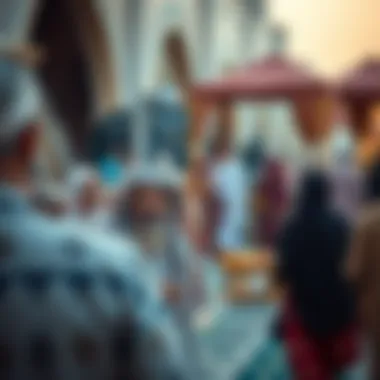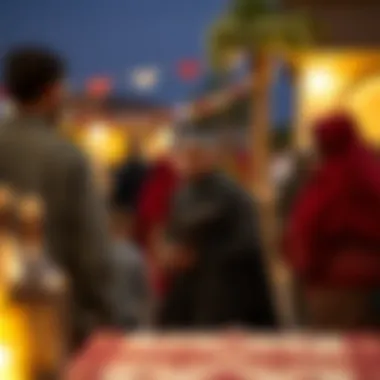Impact of Ramadan on Dubai's Culture and Economy 2023


Intro
The onset of Ramadan carries profound significance, especially in a melting pot like Dubai. As the sun sets and the call to prayer echoes, the skyline transforms, adorned with festive lights and the smell of traditional dishes wafting through the air. The first Ramadan of 2023 heralds an intriguing convergence of spiritual practice and economic activity, setting the stage for both community engagement and market transformations.
The month is not just about fasting; it’s threaded deeply into the fabric of everyday life in Dubai. The atmosphere is electrified, bringing an undeniable charm to the city. This unique spirit of the month presents rich opportunities as it envelopes businesses and real estate in its embrace. To investors and local businesses alike, understanding these dynamics during this critical period holds substantial value.
By exploring how local traditions collide with market trends, stakeholders can make informed decisions that capitalize on this unique occasion. Let's dive into the heart of this exploration with a look at the current market trends and predictions that shape the real estate and business landscape during Ramadan.
Understanding Ramadan in Dubai
Ramadan holds a special place in the hearts of many in Dubai, shaping the rhythms of daily life for the entire month. From a cultural perspective, it delves deep into the values of reflection, sacrifice, and community, extending beyond mere fasting. The significance of understanding Ramadan in this vibrant city can’t be overstated; it is not just a religious observance but a catalyst for social cohesion and local economic activities.
Cultural Significance of Ramadan
For many, Ramadan is about more than abstaining from food and drink from dawn until sunset. This month serves as a period for spiritual growth, allowing individuals to foster a deeper connection with their faith. The cultural practices surrounding Ramadan reflect diversity and unity alike. Whether it’s the call to prayer echoing through the bustling streets or the communal iftar meals shared among families and friends, each moment exemplifies solidarity.
In Dubai, the Iftar gathering is perhaps one of the most notable cultural practices, marking the end of daily fasts. Families often prepare elaborate meals, showcasing a variety of traditional dishes. From dates and water to slow-cooked stews, these meals are a feast for the senses, uniting people over shared flavors and experiences.
Additionally, Ramadan inspires charitable acts. Many actively engage in giving back to the community, reinforcing social bonds. Local businesses often join in, holding campaigns to support those in need. This blend of spirituality and community is what makes Ramadan so rich and fulfilling.
Historical Context of Ramadan in Dubai
The historical roots of Ramadan in Dubai are deeply intertwined with the Islamic civilization. Dating back centuries, it has historically been observed by communities as an essential aspect of their culture. The practices and traditions have evolved, but the core values remain steadfast throughout time.
Dubai's transformation from a small fishing village to a major global city has also influenced the observance of Ramadan. The migration of diverse cultures has enriched the local customs, forging an environment where traditional values meet modern practices. Today, as skyscrapers touch the clouds, the essence of Ramadan is still felt strongly within its neighborhoods: the essence remains uncompromised despite rapid globalization.
In addition, various landmarks light up during Ramadan, creating an ethereal atmosphere. The iconic Burj Khalifa, among others, often displays special lighting in honor of the month. This historical continuity mixed with modern advancements creates a unique context that resonates with both locals and expatriates.
As we dive into the first Ramadan of 2023 in Dubai, it’s essential to recognize not just the religious aspect, but also the cultural and historical significance that enriches the experience. By embracing these dimensions, we gain a more profound understanding of how this month shapes community interactions, informs local businesses, and ultimately influences the broader economic landscape.
"Ramadan is not just a time of fasting but a season of reflection, bonding, and evolution within the community."
In summary, recognizing the cultural and historical frameworks surrounding Ramadan in Dubai allows investors, buyers, and agents to appreciate the dynamics at play, fundamentally shaping interactions and economic activities throughout the month.
First Ramadan of
The first Ramadan of 2023 serves as a pivotal moment for many in Dubai and beyond. This sacred month is not just a time for spiritual reflection but also a significant marker for various sectors, especially real estate and local businesses. As the city prepares for this holy month, understanding its implications can offer valuable insights for investors and stakeholders within the Dubai market.
Date and Timeframe
Ramadan typically depends on the lunar calendar, making its exact start date fluctuate each year. In 2023, the first day of Ramadan is expected to commence on March 23, starting with the sighting of the crescent moon. This timeframe signals the commencement of fasting, prayer, and reflection for Muslims around the world.
- Fasting Duration: The fast begins at dawn and ends at sunset, lasting approximately 29 to 30 days. Each day presents unique challenges and opportunities for both individuals and businesses.
- Eid al-Fitr: Following the conclusion of Ramadan, Eid al-Fitr is celebrated, marking the end of fasting and a time for gathering and festivities. This year, it is anticipated to occur on April 21, which opens a window for community bonding and can lead to increased business during the post-Ramadan period.
The anticipation surrounding Ramadan creates a vibrant atmosphere in Dubai. Local shops and restaurants begin promoting special offers and extended hours in preparation for the Iftar meal that breaks the fast after sunset each day, revealing a lively contrast against the backdrop of fasting.


Local Preparations and Anticipations
As the approach of Ramadan intensifies, the preparations in Dubai are apparent. Businesses from the hospitality industry to retail sectors begin to adapt their services to meet the needs of the community. The significance of these preparations cannot be understated, as they reflect the deep cultural roots and local traditions that characterize Ramadan in Dubai.
- Decorations and Ambiance: Streets and malls are adorned with lanterns and decorations that evoke a festive atmosphere. These contribute to a sense of community and belonging, inviting both residents and tourists to participate in the spirit of Ramadan.
- Iftar Promotions: Restaurants roll out special Iftar menus, offering traditional dishes that cater to the desire for communal dining. Some establishments even host large communal Iftar gatherings, allowing families and friends to enjoy meals together after a day of fasting.
- Charity Initiatives: Many local organizations ramp up efforts to support those in need. Food drives become a common sight as charitable acts are amplified during this month, emphasizing the importance of compassion and generosity.
Overall, the first Ramadan of 2023 is bound to bring a flurry of social and economic activities, shaping interactions and trends in Dubai. It represents a critical opportunity for investors, as understanding these dynamics can lead to strategic decisions that capitalize on the changing landscape during this period.
Key Takeaway: The first Ramadan in 2023 not only marks a period of spiritual reflection but also presents a unique landscape for business opportunities that harness community spirit and cultural significance.
Effects on Local Businesses
The onset of Ramadan in Dubai introduces a multifaceted influence on local businesses, significantly reshaping the economic landscape during this sacred month. For many enterprises, especially those in the retail, food, and hospitality sectors, understanding and adapting to these dynamics is crucial for success. As the city’s population embraces the spirit of Ramadan, businesses must align their offerings with the needs of the community and the traditions of the holy month.
Impact on Retail and Food Services
Retailers and food services really feel the heat during Ramadan, both figuratively and literally. The increase in foot traffic can lead to heightened sales, particularly in food-related sectors like restaurants and supermarkets. With people breaking their fast at iftars, many establishments see a surge in demand for meals that cater to families and large groups.
- Special Promotions: It's common for food businesses to introduce special menus or discounts to attract hungry customers after sunset. Offering traditional meals tailored for Ramadan, such as samosas or dates, can draw crowds eager for authentic culinary experiences.
- Extended Operating Hours: Many retailers extend their working hours into the late evening and even past midnight, allowing them to cater to night owls and those seeking shopping options after iftar. This shift can lead to a significant increase in evening sales, with customers more willing to spend when the sun goes down.
- E-commerce Upturn: Online grocery shopping gains momentum during Ramadan as many consumers prefer ordering essentials ahead of time to avoid the rush. Local platforms see an uptick in customers, highlighting the need for businesses to enhance their digital presence and ensure efficient delivery options to capture this market.
Seasonal adjustments in marketing strategies are crucial as well. Crafting campaigns that resonate with the cultural undertones of Ramadan, using appropriate messaging, and appealing visuals can improve engagement and conversion rates, all while fostering a sense of community.
Increased Demand for Hospitality Services
The hospitality sector often thrives during Ramadan, catering not only to Muslim locals but also to expatriates and tourists interested in the month-long cultural experience. Hotels and restaurants typically ramp up efforts to provide tailored services that resonate with the aforementioned diverse audience.
- Iftar Packages: Many hotels create lavish iftar buffets that include a variety of traditional and international dishes. This not only attracts local families and groups but also tourists who wish to experience the local culture. Popular venues often book up quickly during the month, highlighting the importance of competitive pricing and special offers.
- Cultural Events and Activities: Some hotels host events that celebrate Ramadan’s rich traditions, such as poetry nights or art showcases that promote local talents. These events enhance community engagement while drawing in patrons looking for unique experiences.
- Tourist Engagement: For hotels, Ramadan presents a chance to craft experiences that appeal to tourists wishing to partake in local traditions. Tours that touch on cultural heritage or visits to community initiatives can create a bridge between visitors and the residents of Dubai, enriching the travel experience.
As one can see, the ramifications of Ramadan reach far beyond just a simple observance; they create a ripple effect through local businesses, dramatically altering their operations.
"Businesses that recognize and embrace the significance of Ramadan will not only enhance their customer relations but will solidify their position in the competitive market of Dubai, characterized by its diverse and vibrant community."
Understanding these dynamics not only benefits the businesses during Ramadan but also enriches the overall experience of residents and visitors alike, reinforcing the bonds of community and tradition.
Ramadan's Influence on Real Estate
The intersection of the sacred month of Ramadan and real estate in Dubai reveals a tapestry of cultural significance and economic consequences. As the community shifts into a phase marked by reflection and togetherness, the real estate landscape undergoes notable transformations. This section will delve into how Ramadan influences both rental demand and investment opportunities, offering a roadmap for stakeholders within the real estate sector.
Shifts in Rental Demand
Family housing considerations
As families gather to celebrate Ramadan together, there's a noticeable uptick in demand for family housing. In 2023, many families are seeking spacious accommodations that cater to larger groups, where they can host Iftar gatherings and enjoy communal blessings. Often featuring prominent living areas, family-friendly facilities like parks, and proximity to community mosques, these homes become increasingly desirable.
- Key Characteristic: Versatile layout
- Why It's Beneficial: Such spaces allow for grander gatherings during the holy month, accommodating extended family. Numerous properties are being equipped with amenities that facilitate sharing meals and celebrating traditions together, thereby making them a popular choice.
- Unique Feature: The rentals often come with multi-bedroom options, ensuring privacy yet maintaining connectivity among family members in ways that smaller units simply can't match.
However, it should be noted that this increased demand can lead to higher rental prices, making it crucial for families to plan ahead and look for suitable accommodations well in advance of Ramadan.


Short-term rental trends
Short-term rentals also show a distinctive spike during Ramadan, especially as visitors flood into Dubai, seeking to experience the local festivities and traditions. Properties that cater to tourists are buzzing during this time. The convenience of short stays appeals to both locals inviting family from abroad and travelers eager to engage in the month-long celebrations.
- Key Characteristic: Flexibility
- Why It's Beneficial: Short-term rentals allow for a quick turnover, meeting the needs of those who prefer not to commit long-term, especially during a month characterized by transient family engagements.
- Unique Feature: These rentals often come furnished and well-equipped for vacationing, making them a cozy option for visitors who may not have access to family homes.
While these can offer reasonable income for property owners, challenges arise with maintenance demands and ensuring properties remain in prime condition under frequent check-outs and check-ins.
Opportunities for Investors
Seasonal investment strategies
Investing during Ramadan can yield unique opportunities. Seasonal investment strategies become particularly relevant as certain types of properties may experience higher valuation or demand during this time. Investors who time their acquisitions well can benefit immensely.
- Key Characteristic: Timing the market
- Why It's Beneficial: By understanding the seasonal trends, savvy investors can seek out properties that will be in high demand, enabling better rental yields.
- Unique Feature: Properties with expansive community areas can become hotspots for social gatherings, making them more attractive to renters during Ramadan.
From a long-term perspective, investors looking to understand tenant preferences can craft their approaches accordingly, positioning themselves favorably in the market.
Identifying emerging neighborhoods
Focusing on identifying emerging neighborhoods is crucial during Ramadan. As families gather and new visitors come, certain areas gain prominence. Investors who pay attention to these shifts can recognize neighborhoods on the verge of becoming the next big thing.
- Key Characteristic: Evolving community dynamics
- Why It's Beneficial: Emerging neighborhoods may subsequently experience a rise in value, making early investments more profitable in the future.
- Unique Feature: These areas often provide more affordable options compared to established ones, attracting families looking for ample space without stretching their budgets.
Long-term investors can gain significant returns by planning to develop properties in these burgeoning areas before they become saturated.
Community Interactions During Ramadan
The significance of community interactions during Ramadan cannot be overstated. In Dubai, this time is not just about fasting and prayer; it becomes a unique opportunity for building social ties and enhancing community spirit. The spirit of sharing and bonding is palpable during this holy month, making it a fundamental aspect of life in the city.
Iftar Gatherings and Social Bonds
Iftar, the meal to break the fast, acts as a cornerstone for community interaction. Often, it is not just a meal shared among family; it transforms into a gathering point for friends and neighbors. These communal dinners allow for the exchange of food, laughter, and stories. It’s a chance to reconnect, share experiences, and strengthen social ties.
In Dubai, it’s common to see large iftar tents set up in various neighborhoods, welcoming anyone who wishes to join. This openness fosters a sense of togetherness that can be rare in today’s fast-paced world. Individuals from various backgrounds come together to partake in this meal, breaking down barriers and encouraging multicultural interactions.
Moreover, many families purposely invite others over for iftar, expanding their friendships and reinforcing community bonds. This sharing goes beyond food; it’s about nurturing relationships and embracing the principles of empathy and gratitude.
Volunteering and Charity Initiatives
Another important aspect of Ramadan in Dubai is the culture of volunteering and charitable acts. Many residents feel an intrinsic moral obligation to give back during this month, often organizing or participating in charity initiatives. These efforts range from distributing food to the less fortunate to organizing events that raise funds for various social causes.
The act of volunteering is particularly significant in a diverse city like Dubai, where various nationalities coexist. It’s a platform that encourages people to come together for a common purpose, promoting unity and understanding among different cultures.
For instance, local organizations often set up campaigns to distribute meals or provide essentials to those in need. This not only fills a vital gap in services but also instills a profound sense of purpose and belonging among volunteers.
As a consequence, the community emerges stronger and more connected, proving that collective efforts, no matter how small, have a substantial impact.


"The spirit of Ramadan is not just in the fast, but in the hands we extend to others."
Navigating Real Estate During Ramadan
Understanding the dynamics of real estate during Ramadan is crucial for participants of the property market in Dubai. This period, marked by fasting and reflection, brings unique challenges and opportunities for real estate agents, investors, and developers alike. The unusual schedule of daily activities can lead to shifts in demand, attracting a diverse clientele looking for both short and long-term accommodations. As consumer behavior alters with the fasting hours, real estate professionals must adapt to stay ahead.
Adapting Business Hours and Practices
During Ramadan, business hours tend to shift, reflecting the cultural and religious cultural aspects of this month. Many businesses, including real estate offices, may open later in the day and close earlier, which calls for a flexible approach to operations. For instance, typical working times might move to the late morning or early afternoon and extend into the evening to align with community activities post-Iftar.
This adjustment in timing not only aligns with the spirit of Ramadan but also enhances customer engagement. Agents should consider extending their availability through virtual consultations or evening open houses. Utilizing technology can help mitigate the challenges posed by these new hours. Engaging with clients during traditional gathering times can foster relationships and increase the chances of closing deals.
Marketing Strategies for Properties
Tailored messaging for community engagement
When trying to resonate with potential buyers or renters during Ramadan, tailored messaging becomes imperative. This can involve incorporating themes of family, community, and spiritual reflection in marketing material. By crafting messages that align with the values promoted during this holy month, real estate agents can foster a deeper connection with their audience.
For instance, instead of focusing solely on property specifications, campaigns might highlight the importance of home during gatherings for Iftar or Eid, tapping into the emotional aspect of home life. This kind of approach isn’t merely a shot in the dark; it serves to enrich the buyer's perception of what their future home could represent.
Leveraging digital platforms
Digital marketing strategies also take center stage during Ramadan. A significant percentage of the population turns to online platforms for information and interactions, particularly when it comes to finding accommodations. Well-structured digital campaigns can significantly enhance visibility.
The unique feature of using social media platforms or real estate websites during this time is the ability to reach a wider audience. Posts can be optimized to reflect the spirit of Ramadan, showcasing properties with warm, inviting visuals, and incorporating local cultural references. This approach not only attracts attention but also establishes a strong community connection.
Additionally, the accessibility of digital platforms allows for cost-effective marketing strategies, enabling real estate professionals to maximize their reach without the heavy expenses of traditional advertising. URL links showcasing properties can be shared across various platforms, enhancing organic reach.
By adapting marketing messages and utilizing digital channels effectively during Ramadan, real estate agents can create more meaningful engagements and gain a competitive edge.
Through understanding these strategies, real estate professionals can better navigate the landscape of the property market during Ramadan, ultimately enriching their success through meaningful connections and strategic adaptations.
The End: Embracing the Month
As Ramadan unfolds in Dubai for the first time in 2023, it invites a sense of unity and reflection among its residents. This period is not just an observance; it embodies the cultural heartbeat of the city, highlighting the significance of community and spiritual rejuvenation. Understanding how Ramadan interacts with Dubai's economic fabric, especially in the real estate sector, offers vital insights for investors and local business owners alike.
Reflection on the Month's Observances
Through the lens of the first Ramadan, one may reflect on how these observances transform daily life in Dubai. From the pre-dawn Suhoor meals to the sunset Iftar gatherings, this month fosters connections that bind families and communities. Each evening, the breaking of the fast serves as a poignant reminder of the values of gratitude, sharing, and togetherness. It’s common in the local culture for families to extend invitations to neighbors, creating a mosaic of shared experiences that symbolize the richness of Dubai’s multicultural society.
In businesses, these observances prompt adaptations that align with the spiritual ethos of the month. For instance, retailers may introduce special promotions that cater to the cultural practices surrounding Ramadan, such as festive meal kits or gift items suited for the occasion. This particularity emphasizes how the month isn’t merely an interruption in the business calendar but a unique opportunity to strengthen customer relations, mirror societal values, and solidify brand loyalty.
"Ramadan is not just a month of fasting; it’s a time for reflection, charity, and redefining priorities."
Anticipating Future Impacts
Looking ahead, the implications of the first Ramadan in 2023 are multifaceted. The understanding garnered from this experience will likely shape future strategies for businesses, especially in real estate. Investors must consider how seasonal demand trends can shift during Ramadan, with potential spikes in short-term rental offers geared towards tourists and expatriates seeking to immerse themselves in local traditions.
The infusion of new cultural activities throughout the month could also create emerging opportunities for property development. Areas that see higher concentrations of community events, such as Iftar markets or cultural festivals, might become hot spots for increased rental and purchase interest. This underlines the importance for investors to not just observe but actively engage with the ebb and flow of community activities during this month.
As the fabric of Dubai evolves alongside its cultural practices, acknowledging Ramadan's influence on economic behavior becomes crucial for anyone involved in the real estate market. The nuanced understanding gained this month will help stakeholders make informed decisions, anticipating changes derived from community sentiment and evolving traditions.
In summary, embracing the month of Ramadan is integral for both personal introspection and professional foresight. As cities like Dubai navigate the intricate interplay of faith, culture, and commerce, the lessons learned during this significant period will resonate long after the month is over.







